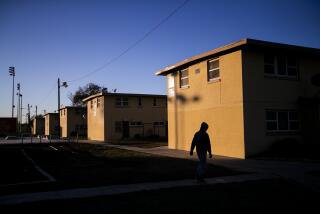Water Meters for Everyone
- Share via
An estimated 700,000 California homes do not have water meters. Their privileged occupants can water their lush lawns, overfill their swimming pools and wash their sport utility vehicles to their hearts’ content while paying a flat fee for the water. In the 21st century, with water supplies stretched thin everywhere in the state, it is hard to believe that this wasteful practice still goes on.
It wouldn’t, under legislation by Assemblywoman Christine Kehoe (D-San Diego). Kehoe’s AB 306 has won support from the Assembly Water, Parks and Wildlife Committee and now continues its push through the legislative maze. The reform is long overdue.
Most of the cities and suburbs without meters are in the Central Valley, the basin that receives most of the state’s major rivers. Since 1992, law has required that new homes have meters, but existing homes were exempted.
The most meter-less cities are Sacramento and Fresno, where the average unmetered home’s water consumption is double those with meters. For years, these cities resisted retrofitting older homes with meters because of the initial cost and citizen opposition. Fresno is finally giving in, surrendering to a requirement of the U.S. Bureau of Reclamation, one of its major water suppliers.
Sacramento carries on alone, saying this is the worst time to require meters because of city budget problems. The city utilities director said at a hearing April 8 that metering would boost the monthly water bill of a typical household to $31.84 from $17.85 -- an increase some say is exaggerated. Whatever the rate, homeowners would be paying a more realistic amount for the water they use.
Nearly half the estimated 700,000 homes that don’t have meters are in Sacramento and its suburbs. The bill would give the area until 2009 to install meters and raises the possibility of state help through bond issue funds. A city that refused to comply could be denied state sewage treatment grants and permission to expand its water supply.
Installing meters, aside from the fairness of it, would save enough water to fill a major reservoir. It’s an investment worth making.
More to Read
Get the L.A. Times Politics newsletter
Deeply reported insights into legislation, politics and policy from Sacramento, Washington and beyond. In your inbox twice per week.
You may occasionally receive promotional content from the Los Angeles Times.










